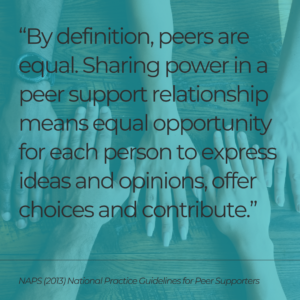Peer Support is an extremely effective and evidence-based mental health service that uses a person’s lived experience to help others in their recovery. This blog is part of our new yearlong series, where each month we will take a deeper look at what it means to work as a Peer Support Specialist and how to adhere to the 12 ethical guidelines created by the National Association of Peer Supporters (NAPS).
For this blog, we will be focusing on the guideline that states peer support is equally shared power.
 Why is this guideline important?
Why is this guideline important?
Often in the world of treatment there is a power dynamic between the providers and the people that they serve, in which the providers are the ones making decisions about a person’s care. Regardless of the motivations for that dynamic, it does not provide an opportunity for any person to feel empowered to make their own decisions in the future. Having a sense of agency and control in one’s own life can be extremely helpful in their journey to recovery, and Peer Support Specialists are in a position in which they can help support that self-direction.
What does this guideline look like in practice?
It is understandably difficult to encourage equally shared power when working as a Peer Support Specialist, especially if they are working in a setting that is not entirely focused on peer support. There can be expectations placed on the Peer Specialist to participate in tasks such as enforcing rules within the organization, giving out medication, requiring drug testing, or even using a clipboard when working with a peer. These may not seem like a big deal to those who have seen these practices normalized within other healthcare settings, but it needs to be understood that those acts have an underlying theme of a difference of power.
If a situation arises where certain policies need to be followed, a Peer Specialist can certainly remind the person they are working with of the expectations in place. However, if the Peer Support Specialist becomes a rule enforcer, it will permanently damage the power balance in the relationship. If the need for medication or drug testing arises, Peer Specialists can discuss the process with the person they are working with, but they should never be the one administering the medications or tests.
When working with someone for the first few times, it may be difficult to create a space of equally shared power, especially if this is the first time a person has had an opportunity to share their own ideas about what they would like to see in their care. Peer Support Specialists may have to work harder in the beginning to establish shared power by asking more questions and focusing more on what the person may want out of this relationship. Eventually it may get easier to let the person take over and continue to support them as they feel more comfortable in expressing their thoughts and opinions.
Throughout the process, it can be helpful to think “How can I support this person in feeling more empowered” and keeping that in a conscious awareness when working together. Try adopting a language that reflects the mentality of equally shared power, by using statements like:
“What would you like to do moving forward”
“What would you like to do differently?”
How to use this guideline moving forward
Power dynamics can be tricky things to spot, as they have become so normalized in our culture. We are used to looking to others to tell us what to do, and especially when feelings of hopelessness arise, it can be hard to feel like we should be the ones in control. However, each and every person should have some sense of self-direction in their lives, and Peer Support Specialists are in the perfect position to help others in developing that agency and ultimately feeling empowered by it.
Remember, when helping someone step up it is about how they would like to step up, not how you would like to see them do so. Keeping up a dialogue about what they want their next steps to be and how they feel about those next steps is key to keeping their sense of autonomy.
